![How dangerous is the new coronavirus? Medical staff attend to a patient infected by the coronavirus at a makeshift hospital in Wuhan City [YFC/EPA]](https://www.aljazeera.com/mritems/imagecache/mbdxxlarge/mritems/Images/2020/2/6/96a903cdbcb1435ba2b61a621e8e38cc_18.jpg)
The fast spread of a new coronavirus in China has prompted global alarm, with neighbouring states closing their borders, global airlines suspending flights and some governments barring entry to foreign nationals who have recently been to the Asian country.
The rapidly spreading virus, which is thought to have originated in the central city of Wuhan in late December and has since been detected in more than two dozen countries, has infected more than 68,500 people and killed at least 1,665 in mainland China. One person in Hong Kong, one in the Philippines, one in Japan, one in France, and one person in Taiwan have also died from the virus, known as COVID-19.
In a bid to limit its spread to countries with weak health systems, the World Health Organization (WHO) on January 30 declared the new outbreak a public health emergency of international concern.
The UN health agency initially criticised the international travel curbs and flight suspensions against China, but on February 11 said countries should be "as aggressive as possible" in combating the virus.
Advertisement
Key questions answered
So just how dangerous is COVID-19 and how worried should you be?
The simple answer is we do not know enough yet and will not know until more data becomes available.
But experts say the key factors are how contagious the new virus is and what proportion of infected people become severely ill.
The new coronavirus is part of a family of viruses that include the common cold and the severe acute respiratory syndrome (SARS), which also originated in China in 2002.
It spreads primarily through droplets dispersed when an infected person coughs or sneezes, and can also be transmitted via contaminated surfaces.
According to Chinese statistics, about 2 percent of people infected with COVID-19 have died so far. In comparison, about 10 percent of the 8,437 people infected with SARS during the 2002-2003 outbreak died, while the Middle East respiratory syndrome (MERS), which originated in Saudi Arabia in 2012, had a fatality rate of about 35 percent.
Seasonal influenza outbreaks, meanwhile, kill less than 0.1 percent of people who fall ill, but as many as one billion people are estimated to catch the flu virus annually. That means between 290,000 and 650,000 people could die from the common cold every year.
However, it may be too early to estimate fatality rates for the new coronavirus as we are still in the early stages of the outbreak.
And, unlike the common cold, the new type of virus has no vaccine and no specific medicine recommended to prevent or treat it.
Another key measure in judging the danger of the new virus is its transmissibility.
According to an analysis published on January 26 by scientists at Harvard University in the United States, each infected person could pass on the new virus to up to three people on average, making it as contagious as SARS.
However, new data since then suggests the virus could be far more infectious - it has spread to more than 28,000 people within weeks of its detection, outstripping the total from the months-long SARS outbreak.
The WHO says it is people living or travelling in the area where the virus is circulating who are at risk of infection. At present, the virus is circulating in China, and non-Chinese nationals who have been infected are among people who have recently travelled there or who have been living or working closely with such travellers.
This suggests the risk to most people outside China is low.
Citing preliminary information, the WHO also says the virus only seems to survive on surfaces for a few hours. "Simple disinfectants can kill the virus making it no longer possible to infect people," according to the agency.
And, while there is still much more we need to learn about how the new coronavirus affects people, it is older people and people with pre-existing medical conditions who are more at risk of becoming severely ill if infected, according to the WHO.
To protect against any viral illness, the global health agency recommends that people wash their hands frequently and avoid touching their eyes, nose and mouth to minimise the risk of transmission. It also recommends covering the mouth and nose with an elbow or tissue while sneezing and coughing, and seeking medical care in case of fever, cough and shortness of breath.
SOURCE: AL JAZEERA NEWS
Advertisement
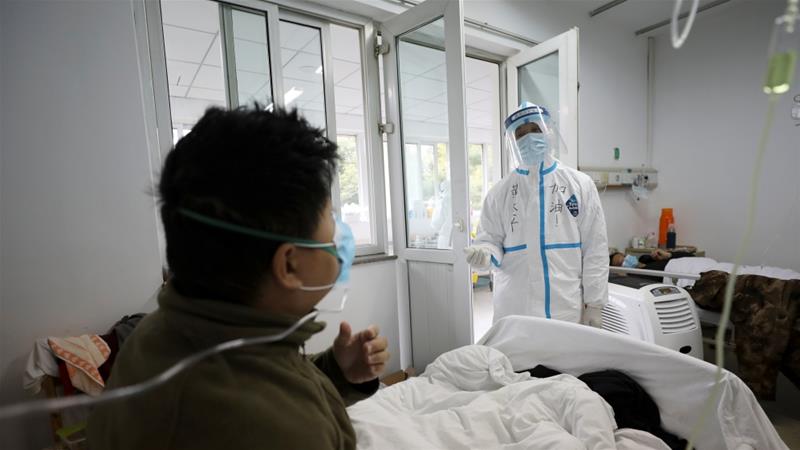
China's National Health Commission has announced that the death toll from the coronavirus outbreak in mainland China reached 1,770 as of the end of Sunday, up by 105 from the previous day.
At least 100 of the new deaths were from the province of Hubei, the epicentre of the epidemic, the Commission said on Monday morning. Across the country, there were 2,048 new confirmed infections, about 1,933 from Hubei alone, pushing the new total to 70,548.
On Sunday, Hubei announced tough new measures to try to curb the outbreak, ordering its cities to block roads to all private vehicles. Meanwhile, a newly published speech published speech revealed Chinese President Xi Jinping was aware of the potential severity of the outbreak long before the public was informed.
Here are all the latest updates:
Monday, February 17
Japan cancels Emperor's birthday public celebrations amid virus fears
Japan said Monday it would cancel a public gathering to celebrate the birthday of new Emperor Naruhito, as fears grow over the spread of the new coronavirus in the country.
"In light of various situations, we have decided to cancel the visit by the general public to the palace for His Majesty's birthday," the imperial household agency said in a statement a day after the government warned people to avoid crowds and "non-essential gatherings."
"In light of various situations, we have decided to cancel the visit by the general public to the palace for His Majesty's birthday," the imperial household agency said in a statement a day after the government warned people to avoid crowds and "non-essential gatherings."
Australia to evacuate over 200 citizens from quarantined cruise ship
Australia will evacuate more than 200 of its citizens onboard the coronavirus-stricken cruise, the Diamond Princess, which has been quarantined since arriving in Yokohama, Japan on February 3.
Morrison said the passengers will depart on Wednesday and will be taken to Australia's tropical north, where they will be required to be quarantined for another 14 days.
Filipino crew members infected by coronavirus in cruise ship rise to 27
The Philippine Department of Foreign Affairs reported on Monday that there are now 27 Filipinos on board the Diamond Princess cruise ship who have been infected of the coronavirus.
The number includes 16 new cases confirmed on Saturday, the 15th of February, according to the statement issued by the Philippine embassy.
There are an estimated 531 Filipino crew members and seafarers, as well as seven Filipino passengers on board Diamond Princess, which is now docked and under quarantine in the port of Yokohama, Japan.
Japan keeps high coronavirus alert as more citizens return from China
Japan evacuated more citizens from the epicentre of the coronavirus outbreak on Monday, while the disease's spread prompted a hospital to stop accepting new patients and raised the possibility of restricting participants at the Tokyo Marathon on March 1.
A fifth government-chartered flight carrying 65 Japanese citizens arrived in Tokyo from Wuhan, China, early on Monday, bringing the total number repatriated from the city to 763, broadcaster NHK reported.
A hospital in Sagamihara, 50km (31 miles) west of Tokyo, said it would suspend admissions of new patients as one of its nurses tested positive for the virus after treating a patient who later died of the disease.
With more than 400 people infected, most of whom are passengers on a cruise ship docked in Yokohama, Japan is the country most affected by the epidemic after China, where the outbreak was first detected in December.
What can US evacuees from Japan cruise ship expect next?
Al Jazeera's John Hendren, reporting from Washington, DC, said the US citizens being evacuated from the Diamond Princess cruise ship, docked at Yokohama in Japan, had a "no-frills" journey ahead of them.
After having spent 10 days in quarantine on the ship, the US nationals who tested negative for the coronavirus will board a cargo plane to return to the US.
"They've been told that it will be cold, they should bundle up, they should bring their own food and for those with bags over 70 pounds (32kg), they're told those bags will not make the trip," Hendren said.
Once home, the evacuees will need to spend two more weeks in quarantine at military bases in California and Texas.
Forty US citizens on board cruise ship are infected: Health official
A senior US health official has said more than 40 US nationals on the quarantined cruise ship in Japan have been infected with the deadly coronavirus.
"Forty of them have gotten infected," Anthony Fauci, a senior official at the National Institutes for Health said on a CBS news programme.
The US Centers for Disease Control and Prevention (CDC) said on Saturday that 400 US nationals on the ship would be evacuated and flown back to the US.
But Fauci said those confirmed with infections would not be allowed to fly.
"They are not going to go anywhere," he said, "They're going to be in hospital in Japan."
Three Israelis among those infected on cruise ship
Israel's Ministry of Health has confirmed a third Israeli citizen onboard the quarantined Diamond Princess cruise ship has tested positive for the coronavirus.
The patients have been transferred to a medical centre in Japan and Israel will send an "expert physician to be in direct contact with relevant agencies in Japan and follow the patients' case throughout the medical procedure," the ministry said in an online statement.
A total of 355 people on the ship have tested positive for the virus.
More than 100 Germans released from quarantine
More than 100 German nationals have been released from quarantine at a military base near Frankfurt airport, two weeks after flying in from Wuhan.
"All the people concerned have been allowed to leave the quarantine zone and rejoin their families," Thomas Gebhart, secretary of state for health, told a press briefing.
None of the individuals in quarantine was infected with the virus.
Parents protest over Pakistani students trapped in China
About 100 people have called on Pakistan's government to "bring back our children" from locked-down Hubei province at a demonstration in Karachi.
Pakistan's government has so far ruled out evacuating the more than 1,000 Pakistani students in the province. Health Minister Zafar Mirza and others are due to hold a meeting for parents in Islamabad on Wednesday.
But many students and their families have expressed growing fears and frustration as the death toll in China mounts, pointing to other countries, including neighbouring India and Bangladesh, that have evacuated their citizens.
"For God's sake, we request from the government representatives please bring back our children, please listen to a mother's grievance," once protester said through her tears.
UAE confirms new case
The United Arab Emirates has confirmed its ninth case of coronavirus.
The country's health ministry said in a Twitter post the patient was a 37-year-old Chinese national. It added the man was in stable condition and was being monitored.
Find out which other countries have confirmed cases here.
US passengers' evacuation from quarantined ship begins: Report
US passengers have begun evacuating a cruise ship quarantined at Japan's Yokohama, boarding buses at the port.
An AFP news agency reporter saw buses in a convoy starting to move away from the boat, though they did not immediately depart the port.
A passenger from the US, Sarah Arana, confirmed to AFP she had boarded a bus and was expecting to take one of two charter flights leaving for the US.
Malaysia insists virus diagnosis from cruise passenger is correct
Malaysia insisted it had correctly diagnosed coronavirus in an elderly US passenger from the Westerdam cruise ship despite all passengers having been given a clean bill of health when they disembarked in Cambodia.
The vessel was at sea for two weeks and was barred from docking in Japan, Guam, the Philippines, Taiwan and Thailand. Cambodia - a staunch ally of Beijing - allowed the ship to dock Thursday in Sihanoukville.
Cambodia urged Kuala Lumpur to "double-check" the diagnosis but Malaysian Deputy Prime Minister Wan Azizah Wan Ismail said the 83-year-old woman had already been tested twice. "Our protocol is actually world-class ... it's a positive," she told a press conference.
Taiwan reports first death from virus
The first death due to COVID-19 has been reported in Taiwan, its health minister said.
The deceased was a taxi driver in his 60s and was hospitalised on February 3, complaining of shortness of breath, which led to a diagnosis of pneumonia. He died late on Saturday, Health and Welfare Minister Chen Shih-chung told a televised news conference.
According to Chen, one of the man's family members also contracted the virus. While the man had not travelled abroad, he had previously transported people from China, Hong Kong and Macau.
Hong Kong protesters rally against virus quarantine centres
Hundreds of demonstrators rallied for a second day in Hong Kong to protest against plans to turn some buildings into coronavirus quarantine centres, reviving anti-government protests in the Chinese-ruled city.
About 100 people braved the rain in the New Territories district of Fo Tan, where authorities plan to use a newly built residential development that was subsidised by the government as a quarantine centre. Riot police stood by.
Beijing theme park to open on schedule
The Universal Studios Beijing theme park is expected to open to the public in May 2021 as scheduled despite the current coronavirus outbreak, a Beijing municipal official told a news briefing.
Construction of the theme park, the fifth such Universal Studios park in the world, is expected to be completed by the end of 2020, the official said.
Hubei province bans vehicle traffic to curb spread of coronavirus
The government of Hubei province, the centre of China's coronavirus outbreak, said a ban will be imposed on vehicle traffic across the province to curb the spread of the virus.
In a published document, it said police cars, ambulances, vehicles carrying essential goods, or other vehicles related to public service would be exempted.
It added that the province will carry out regular health checks on all residents in the province. It also stated that companies cannot resume work without first receiving permission from the government.
Nepal evacuates 175 citizens from Wuhan after coronavirus outbreak
Nepal has evacuated 175 of its nationals from the Chinese city of Wuhan, an official said, after protests by parents of students studying in the city.
A plane operated by state-owned Nepal Airlines carrying 134 men and 41 women, mostly students, landed at Kathmandu's Tribhuvan International Airport before dawn, Health Ministry spokesman Mahendra Shrestha said. All evacuees will be held in quarantine for two weeks in the nearby town of Bhaktapur.
"They will be under the close observation of doctors in quarantine and will be allowed to join their families if found healthy after two weeks," Shrestha told Reuters.
Another 70 people test positive for coronavirus on ship in Japan
Katsunobu Kato, Japan's health minister, said 70 more people on board the quarantined Diamond Princess cruise ship have tested positive for the coronavirus, bringing the total to 355 cases.
Some 3,700 passengers and crew were on board the ship, where the most coronavirus infections outside China have occurred. Those testing positive are transferred to Japanese hospitals.
Read the updates from Sunday, February 16 here.
SOURCE: AL JAZEERA AND NEWS agency
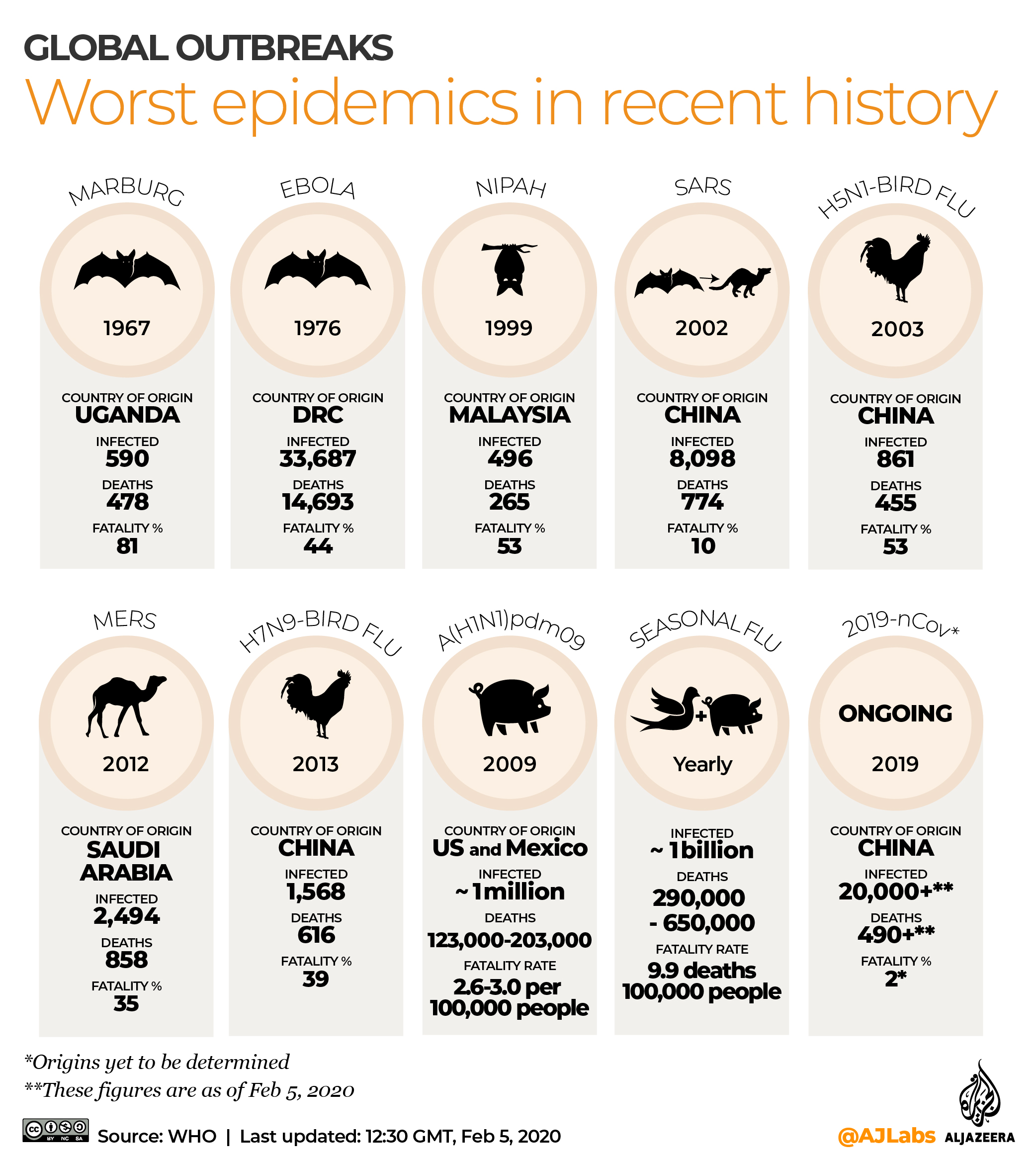

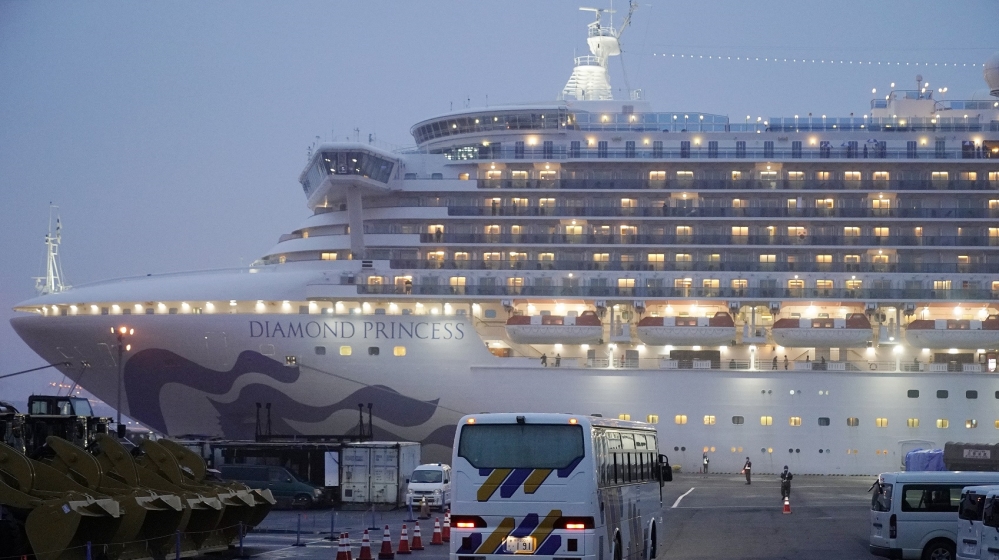

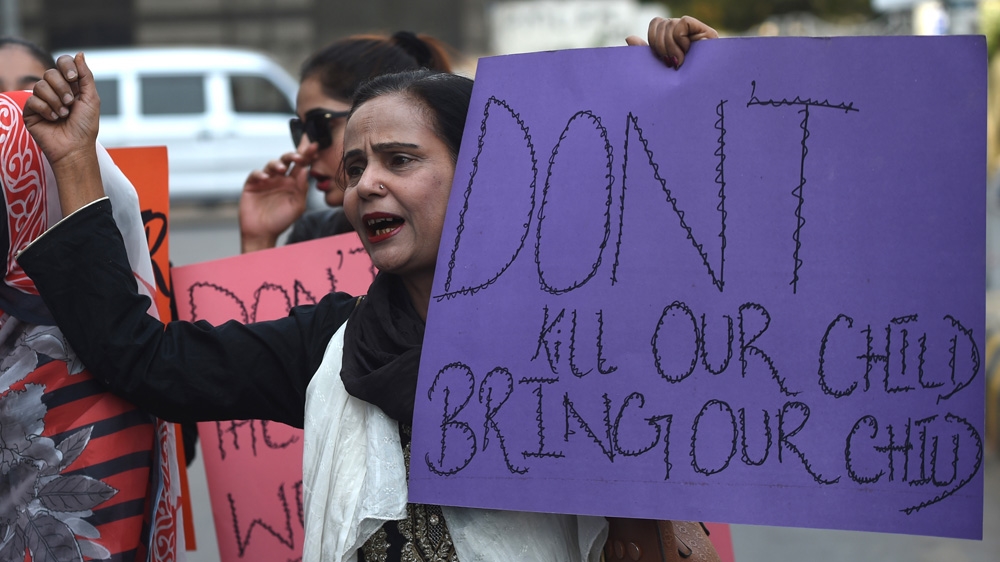

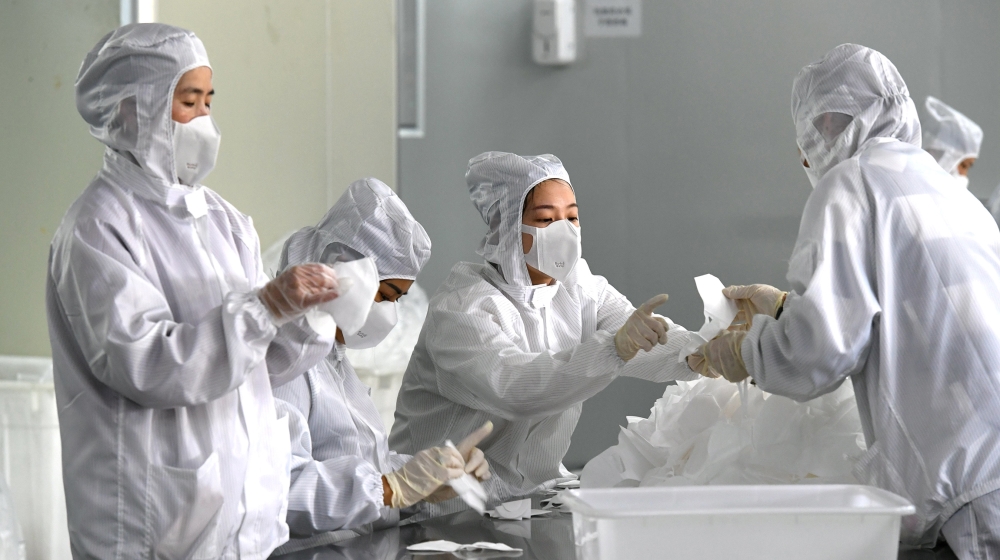
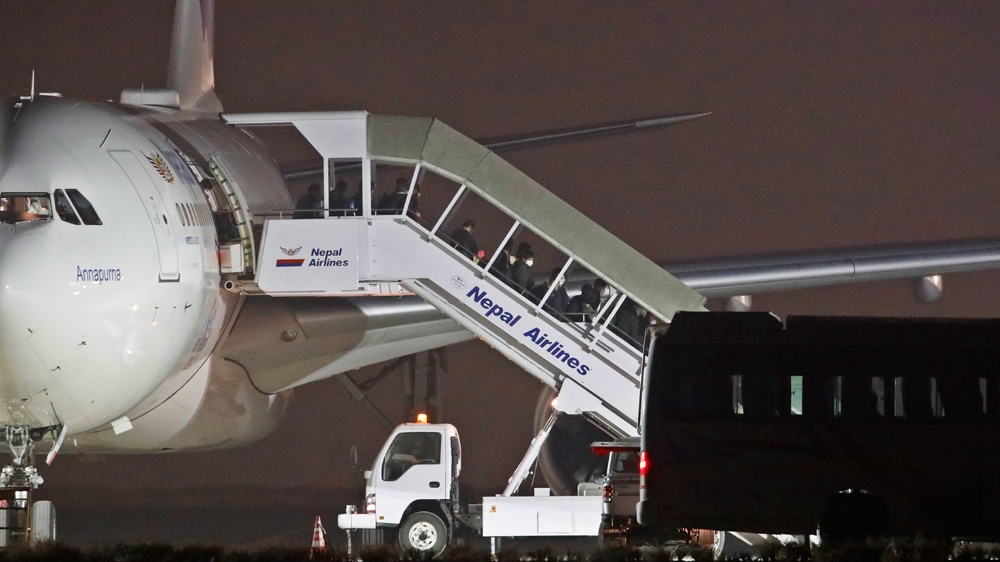
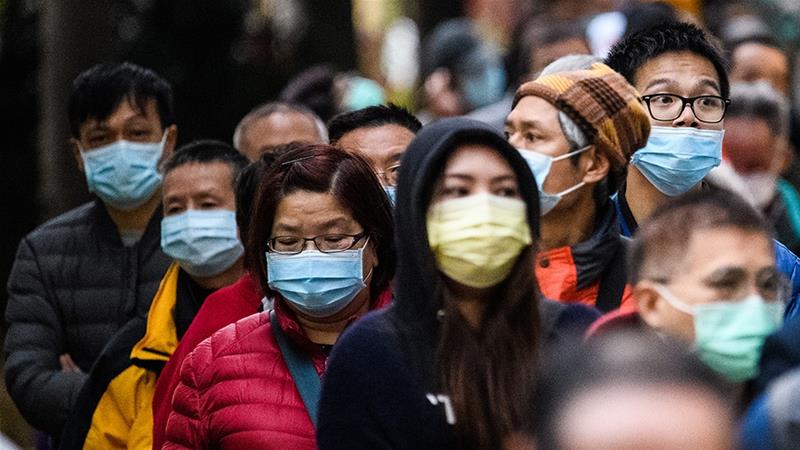

Post a Comment